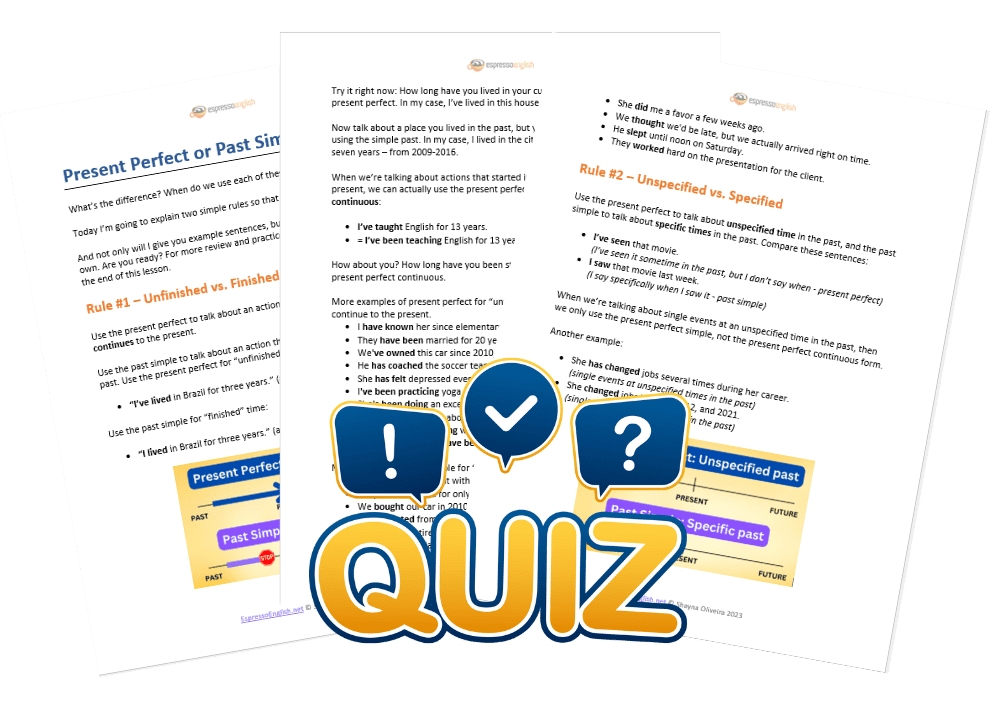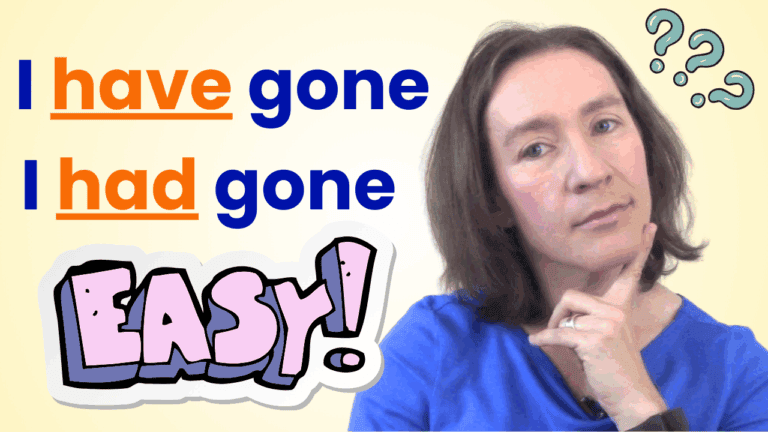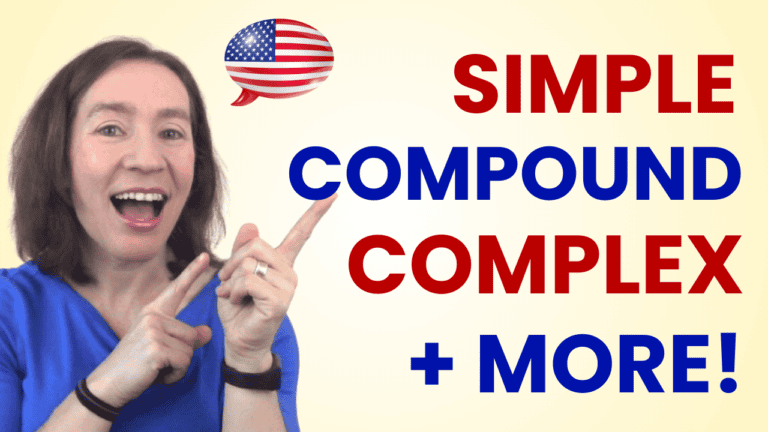
What’s the difference? When do we use each of these English verb tenses?
Today I’m going to explain two simple rules so that it will become clear to you!
Not only will I give you example sentences, but I’ll also ask you to make your own. Are you ready? For more review and practice, make sure to download the lesson PDF and try the quiz inside.
Rule #1 – Unfinished vs. Finished Time
Use the present perfect tense to talk about an action that started in the past and continues to the present.
Use the simple past tense to talk about an action that started and finished in the past.
Use the present perfect for “unfinished” time:
- “I’ve lived in Brazil for three years.” (and I live in Brazil now – that time period is not yet finished)
Use the simple past for “finished” time:
- “I lived in Brazil for three years.” (and I DON’T live in Brazil now)
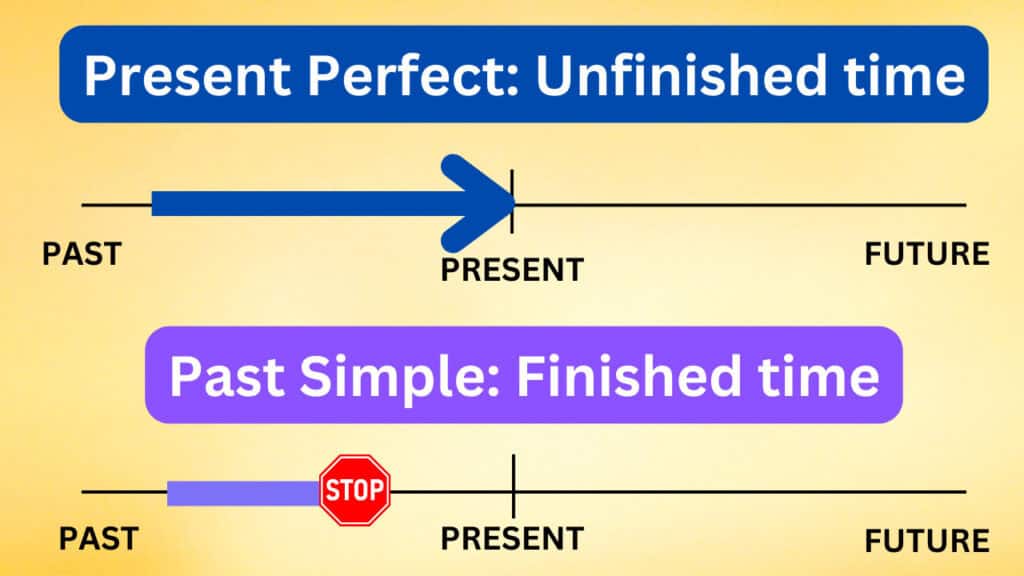
Try it right now: How long have you lived in your current home/city? Use the present perfect. In my case, I’ve lived in this house since 2017.
Now talk about a place you lived in the past, but you don’t live there anymore, using the simple past. In my case, I lived in the city of Salvador in Brazil for about seven years – from 2009-2016.
When we’re talking about actions that started in the past and continue to the present, we can actually use the present perfect simple or the present perfect continuous:
- I’ve taught English for 13 years.
- = I’ve been teaching English for 13 years.
How about you? How long have you been studying English? Answer using the present perfect continuous.
More examples of the present perfect tense
For an “unfinished” time period – started in the past and continue to the present.
- I have known her since elementary school.
- They have been married for 20 years.
- We‘ve owned this car since 2010, and it’s still running well.
- He has coached the soccer team for the past decade.
- She has felt depressed ever since her cat died.
- I‘ve been practicing yoga regularly for the past few months.
- She‘s been doing an excellent job lately.
- We‘ve been thinking about renovating our house.
- He hasn’t been sleeping well since his son was born.
- My colleagues and I have been working late every day this week.
Need help forming these tenses?
Take this lesson on the present perfect and also review these irregular verbs in the past tense and past participle.
More examples of the simple past tense
For “finished” time – started and ended in the past.
- I shared an apartment with three roommates when I lived in New York City.
- They were married for only a year before their divorce.
- We bought our car in 2010.
- He graduated from college last year.
- She was really tired last night – but now she feels better.
- I practiced the piano for two hours last night.
- She did me a favor a few weeks ago.
- We thought we’d be late, but we actually arrived right on time.
- He slept until noon on Saturday.
- They worked hard on the presentation for the client.
Rule #2 – Unspecified vs. Specified Time
Use the present perfect to talk about unspecified time in the past, and the past simple to talk about specific times in the past. Compare these sentences:
- I’ve seen that movie.
(I’ve seen it sometime in the past, but I don’t say when – present perfect) - I saw that movie last week.
(I say specifically when I saw it – past simple)
When we’re talking about single events at an unspecified time in the past, then we only use the present perfect simple, not the present perfect continuous form.
Another example:
- She has changed jobs several times during her career.
(single events at unspecified times in the past) - She changed jobs in 2006, 2012, and 2021.
(single events at specific times in the past)
Now it’s your turn – first, use the present perfect to talk about something you’ve done sometime in your life, but don’t say when. In my case, I’ve taken figure skating lessons.
Now use the simple past to say specifically when you did it: In my case, I took figure skating lessons when I was in high school… about 20 years ago.
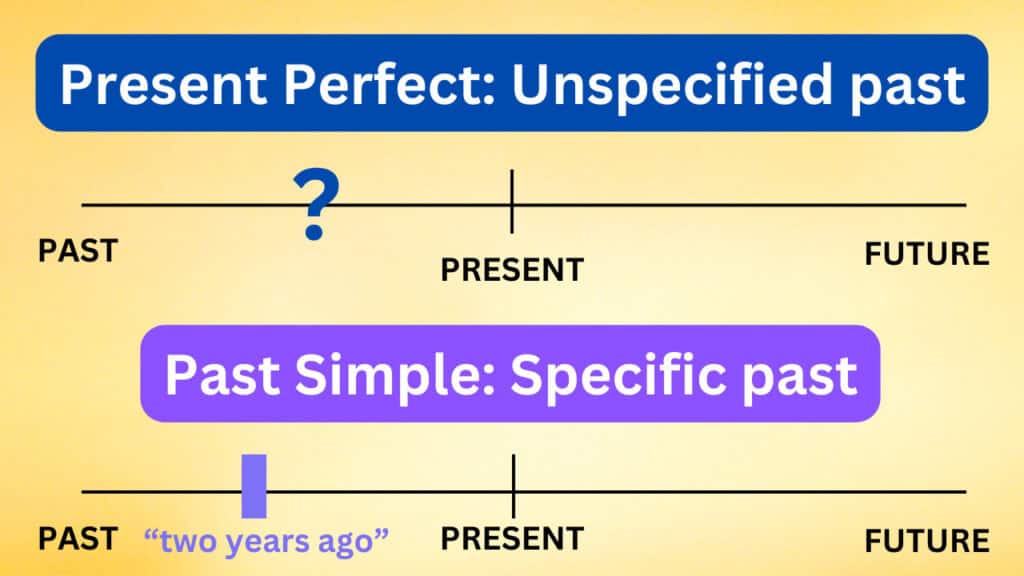
More examples of present perfect
For “unspecified” time:
- I’ve been to Europe twice.
- She’s interviewed a number of celebrities.
- He’s finished his homework.
- They’ve sold their house.
- Have you ever eaten sushi?
More examples of simple past
For “specified” time:
- I went to Europe in 2006 and 2010.
- She interviewed Paris Hilton last week.
- He finished his homework a few minutes ago.
- They sold their house in June.
- Did you eat sushi when you went to Japan?
Review: Present perfect vs. Past simple
- Present perfect for an unfinished time period and unspecified time in the past.
- Past simple for finished time and specific time in the past.
I hope I’ve made it crystal clear when to use present perfect vs. simple past. Thanks for putting it into practice by making your own example sentences! Now make sure to download the PDF and try the quiz.
That’s the type of thing I do throughout the lessons in my Advanced English Grammar Course – I’m always helping you put it into practice and use the grammar yourself. This active practice is what will really help it stick in your mind and become a natural part of your English! Join the course to learn English grammar easily and effectively.
Learn more:


